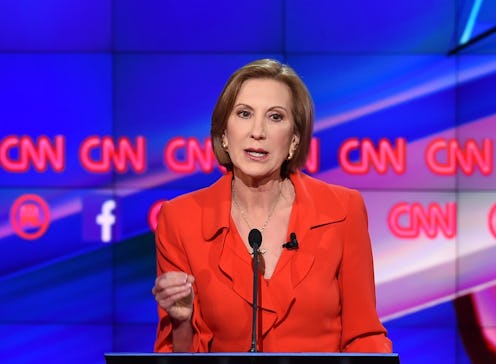News
Carly's Star Has Faded, And Not For A Good Reason
The next Republican debate is steadily approaching. It will be the sixth time this cycle that the GOP presidential contenders have all convened on stage, and a lot has changed since the first few forums. One candidate whose fortunes have shifted drastically over the course of the last few months is Carly Fiorina. Since the summer, she's gone from afterthought to serious contender... and back again. Why have Carly Fiorina updates been so few and far between, and why did her brief surge ultimately prove unsustainable?
Fiorina announced her candidacy in May, and for a while, her support hovered at around 2 percent. Then came the first debate, and everything seemed to change. Fiorina delivered a truly impressive performance at that forum, so much so that it propelled her from the kids' table to the main debate stage. She kept the momentum going at the next debate, giving a response to Donald Trump's sexism comments that even had Democrats cheering, and by the end of September, her poll numbers had skyrocketed to the mid-teens.
Since then, however, Fiorina has sort of just faded away. Her support has steadily fallen, and her poll numbers are now exactly where they were when she started. What happened?
We'll probably never know for certain, but it's worth keeping in mind that this sort of boom-bust cycle isn't at all uncommon during presidential primaries. Candidates often enjoy a brief moment in the sun and then fade, never returning to their former glory. That happened about every 10 minutes during the 2012 cycle — surely you remember Herman Cain — and Fiorina, along with Ben Carson, may be headed toward a similar fate this time around.
And still, the question remains: Why didn't Carly Fiorina's popularity stick? As my colleague and friend Chris Tognotti has pointed out, she would be a stellar general election candidate for the GOP. She's a charismatic, died-in-the-wool conservative, and she's also the only Republican capable of neutralizing Hillary Clinton's "first woman president" pitch. If the Republican Party truly wanted to expand its outreach to women, as it claimed in 2012, it would be hard to find a better presidential pick than Fiorina.
We'll never know the answer for sure, but a few possibilities are worth consider. For one, while Fiorina does have a business background — a plus for any Republican candidate — her actual performance as CEO of Hewlett-Packard was unambiguously terrible. The GOP may love business leaders, but it doesn't love ineffective ones; you can disagree with Mitt Romney or Donald Trump's business ethics, but it'd be hard to argue that they weren't successful at what they did.
There's another explanation, and it's not a pretty one. It may well be that Republicans, for all of their talk of outreach, simply aren't ready for a woman in the White House. This is, of course, purely speculative, but it seems relevant that the frontrunner for the Republican nomination is unabashedly sexist. And interestingly, Fiorina's collapse in the polls occurred in late September — immediately after she called out Trump for his sexism at the second GOP debate.
As evidenced in polls, the Republican Party seriously considered Fiorina for a moment, then appeared to decide Trump was the better option. We may never know the reason why, but if the eventual Republican nominee loses, the GOP may kick itself for not giving Fiorina a legitimate shot.
